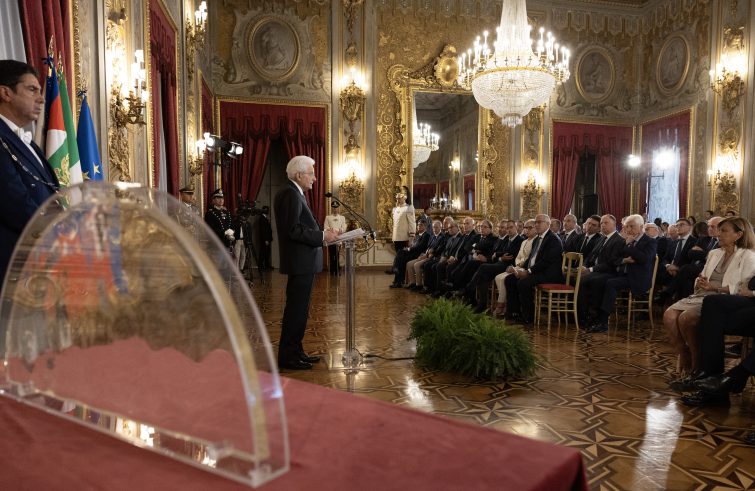
“Any act directed against freedom of the press, any attempt to distort it into fake news, is a subversive act against the Republic.” In his address to the parliamentary press at the traditional ‘Fan Ceremony’, the President of the Italian Republic, Mattarella, offered a firm and impassioned defence of freedom of the press. Given the present circumstances and the recent unfolding of events, these words are particularly relevant in that they delineate a constitutionally-mandated “function” and a “decisive democratic role” that journalists are called upon to fulfill.
“There has been a rise in the incidence of disputes, intimidation, and on occasion, even aggression, directed at journalists engaged in reporting the facts,” stated the Head of State. “However, this is precisely the essence of journalism. As evidenced by recent events in Turin, it is imperative to document the facts with no preferential treatment, shed light on hitherto overlooked facts, raise awareness, and provide a platform for public participation and an appeal to the institutions.”
These principles form part of the historical development of our democracies. However, they must also be applied to the contemporary context, in which digital platforms have become the primary source of information, alongside traditional media such as newspapers, the press, radio and television.” In light of these developments, President Mattarella observed, “it is paradoxical that such a significant role is accompanied by the notion that there are fewer obligations involved, resulting in the wholly unacceptable tendency to evade them.” It thus falls upon the Italian Republic and the European Union to “ensure that the values of pluralism are upheld in the new domains and that the conditions are created to facilitate the ongoing transition process.”
Following the inaugural address by the President of the Parliamentary Press, Adalberto Signore, the Head of State addressed the most salient international issues, with a particular focus on Ukraine and the Middle East. “It is very saddening that the world is wasting huge sums of money on armaments when it would be much wiser to use financial resources for purposes of social value,” said Mattarella. However, “those who attack the freedom of others” are responsible for this distorted process, not “those who defend their own freedom”, continued the President of the Republic. The Head of State then evoked the events leading up to the outbreak of the Second World War and argued that “Italy, its allies, its partners in the Union, while supporting Ukraine, are defending peace in order to prevent a series of attacks on weaker neighbours”, attacks that “even in this century” would eventually lead to “the outbreak of a global war”. At the same time, Mattarella noted, “we consider it indispensable to work for an end to war – in Ukraine and between Israel and the Palestinians – so as to eradicate these hotbeds of hatred that wars also represent for the future.”
A “subculture inspired by hatred” is also responsible for the dramatic incidents recalled by the President of the Republic, starting with the attempted assassination of Trump, together with “mounting anti-Semitism” and an “increase in religious and racial intolerance” that have “crossed the danger level”. This hatred is so often fuelled online by what Mattarella called “sorcerer’s apprentices”, who must not only be “firmly” and “uncompromisingly” condemned, but also “actively countered with severity and rigour”. At a time of great tension and uncertainty, the President added, many people “feel disoriented, perhaps even helpless” and “are in danger of falling into the deceptive trap of those who would have us believe that there is an easy solution: to return to a golden age that no longer exists (if it ever did). And there never will be. History moves forward, change cannot be stopped, time does not go backwards.
Commenting on the upcoming US elections, Mattarella expressed his appreciation for Biden’s role and recommended that Italy’s stance be “based on respect for our national interests and the principles enshrined in our Constitution.”
With regard to the national reform debate, the Head of State reiterated that he would adopt a general approach, as he had done in his speech at the Social Week in Trieste. With regard to the electoral system, he explained that his reference to it was prompted by concern about abstentionism, raising the question of whether one of its causes could be ”discontent caused by the perception of an excessive restriction of the choices actually entrusted to the electorate”. Mattarella seized the opportunity of the meeting with the parliamentary press to make a pertinent observation on the non-election of the fifteenth Constitutional Court judge. “This is a violation of the Constitution committed by Parliament, the very body that the Constitution considers central to the life of our democracy,” the President said in deliberately serious terms, urging “respectfully but firmly” to provide for the appointment of the judge, whose post has been vacant since last November.
The President devoted the last part of his speech to the problem of prisons, after receiving a letter from inmates describing “conditions that are unworthy of a civilised country such as Italy is and should be”.
“Prison,” said Mattarella, “must not be the place where all hope is lost, it must not thus become a breeding ground for criminals. A number of fruitful and important work-based rehabilitation programmes are under way. They show that in many cases a different kind of prison is possible. It is a duty to pursue these avenues. Immediately and everywhere.”












